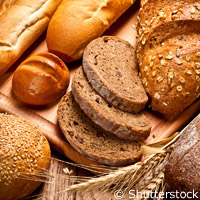Marrying innovation with old traditions for European bread
It's safe to say that Europeans love their bread. Whether it's Germany's dark pumpernickel or France's baguette, Europeans enjoy consuming this starchy food. A team of researchers led by Kaunas University of Technology in Lithuania believes that Europeans are now baking their own, or buying it from their local bakeries. The results are part of the FERMFOOD ('Fermented products by using lactic acid bacteria with antimicrobial activity for bread production') project, which is supported under EUREKA, the European platform for research and development (R&D). Professor Grazina Juodeikiene of Kaunas University of Technology suggests that people are looking for the flavour and texture that most industrial bread makers omit from their products. According to Professor Juodeikiene, the results of the study may provide the means for bread to retain the taste consumers crave while safely remaining on the shelves for longer periods of time. When a foreign company visited Lithuania to teach local bakers how to bake different types of bread, Professor Juodeikiene decided to investigate how bread can be made to be both delicious and long-lasting. 'It was excellent, but the next day you could play baseball with it,' she says. 'My idea was to develop bread with what I now call the big 5: longer shelf life, better flavour, better texture, with more dietary fibre and fewer additives.' The study obtained some interesting results including ways to meet the demands of today's consumers by drawing on an ancient bread-making technique. Lithuanians, along with Estonians and Latvians, eat sourdough bread, made using a natural leavening method that some experts believe dates back to the time of ancient Egypt. Most nations replaced this leavening technique by industrially processed yeast and food additives. Sourdough bread, however, continues to be a main staple in the Baltic and other parts of the globe. The key ingredient in sourdough is a 'starter' or 'mother' of flour and water that ferments when a lactobacillus culture is added. This starter is what gives lightness to the dough. Bakers feed and preserve this living culture in order to use it in successive loaves. Lithuanian bakers depended on starters made abroad. So Professor Juodeikiene believed it was time for Lithuanians to develop their own starter dough. For the purposes of this study, the FERMFOOD team collected samples of the lactobacillus cultures from bakeries across Lithuania. The researchers from Estonia, Latvia and Lithuania evaluated the various forms of cultures; they explored what factors impacted the sourdough bread and when it would go mouldy. The bread's texture was tested with sophisticated equipment. Thanks to acoustic waves, the team were able to repeat tests on the same slice of bread because it didn't fall to pieces. The team developed more effective cultures to generate better long-lasting bread, with some loaves lasting three weeks and being free of mould. Government representatives from abroad have already expressed an interest in the results of the FERMFOOD project. The Japanese embassy at Vilnius has requested more information about the outcome of the bread-making technique. 'The next big challenge is how we feed a growing world population,' Professor Juodeikiene says. 'We have no option but to intensify crop production. What was so nice about FERMFOOD is how practical it was, and that I see such a future in this research.'For more information, please visit: FERMFOOD: http://www.eurekanetwork.org/project/-/id/3966 EUREKA: http://www.eurekanetwork.org/
Countries
Lithuania



